Ho Became President in 1868 and Again in 1872 Who Became President in 1868 and Again in 1872
This section contains information and memorabilia on the elections from 1832 to 1872. Ringlet down the folio to learn more most specific election years.
Election of 1832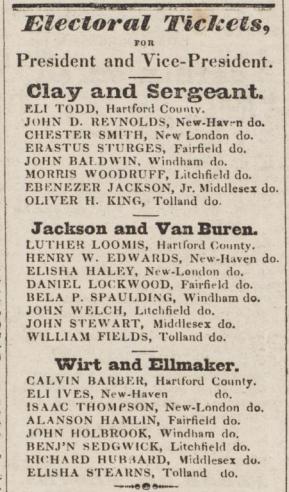
For the commencement time, the major political parties held national conventions to nominate their candidates. Democrat Andrew Jackson was once more nominated and was opposed by National Republican Henry Dirt. Another first was the presence of a third-party candidate for president. William Wirt was nominated by the Anti-Masonic Party, whose platform was opposed to freemasonry as a secret organization of privileged, wealthy men seeking to rule the country. The major event of the campaign was President Jackson's veto of a bill to extend the charter of the U.S. Bank. Jackson felt that the U.Due south. bank controlled the economy and favored the wealthy. His veto was strongly criticized and opposed by Clay, who supported a strong federal government in economic affairs. Clay had raised the issue of the bank'south re-charter, knowing that Jackson opposed it. Because some Democrats favored re-charter, Clay hoped the issue would split Jackson'due south party. Most ordinary Americans, even so, supported Jackson. He won reelection hands when he received 219 balloter votes to 49 for Dirt and 7 for Wirt. Virginia bandage its 23 balloter votes for Andrew Jackson.
Election of 1836
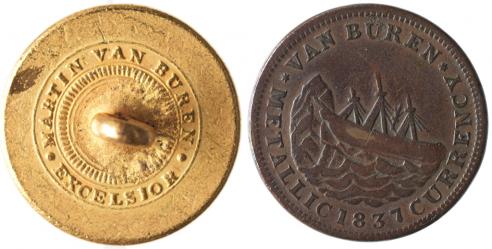 By the time of the 1836 election, the National Republican Political party had been replaced past a new party consisting of former Republicans, anti-Masons, and anti-Jackson Democrats. Their common interest was opposition to Andrew Jackson's policies. Taking its name from an English political party that had opposed King George 3 during the American Revolution, this new Whig party united against "King Andrew I" (the label given to Jackson by his opponents). President Jackson decided not to run for a 3rd term and instead endorsed his current vice president, Martin Van Buren. Despite some opposition from
By the time of the 1836 election, the National Republican Political party had been replaced past a new party consisting of former Republicans, anti-Masons, and anti-Jackson Democrats. Their common interest was opposition to Andrew Jackson's policies. Taking its name from an English political party that had opposed King George 3 during the American Revolution, this new Whig party united against "King Andrew I" (the label given to Jackson by his opponents). President Jackson decided not to run for a 3rd term and instead endorsed his current vice president, Martin Van Buren. Despite some opposition from 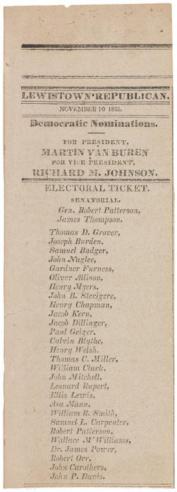 the southern wing of the political party, the National Democratic convention nominated Van Buren for president and Richard Johnson for vice president.
the southern wing of the political party, the National Democratic convention nominated Van Buren for president and Richard Johnson for vice president.
As the election approached, the new Whig party was not nonetheless firmly organized and could not agree on a specific candidate. Instead, information technology decided to run "favorite son" candidates in different regions of the country. The programme was to secure enough balloter votes to foreclose Van Buren from receiving a bulk. The ballot would then get to the Business firm of Representatives, where the Whigs could unite backside one candidate. Country legislatures nominated Daniel Webster in the northeast, William Henry Harrison in the w, and Hugh White in the southward.
Although Van Buren lacked the popularity that Jackson had enjoyed, he easily defeated the iii Whig candidates, receiving 170 electoral votes to their combined 113 (Harrison had the most with 73). The controversial Richard Johnson did not win the majority of the balloter votes for the vice presidency. Under the 12th Subpoena, for the only time in American history, the Senate chose the vice president. Johnson was elected over Whig candidate Francis Granger. Virginia cast its 23 electoral votes for Martin Van Buren.
Election of 1840
In a national convention, the Whig Party united to nominate William Henry Harrison, who had been its virtually popular candidate in the 1836 election. Despite a astringent and prolonged economical low that had plagued his offset term in part, President Martin 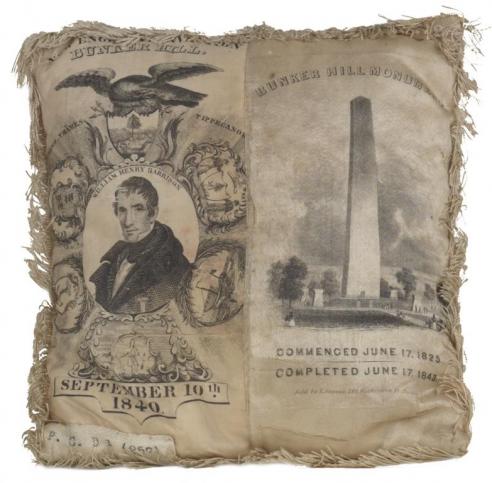 Van Buren continued to take the support of the Democratic Party. The antislavery Liberty Party nominated James Birney as its candidate. Harrison's nickname, "Old Tippecanoe," came from victory over Native peoples, including Shawnee and Siouan-speaking Ho-Chunks (Hoocągras), at the battle of Tippecanoe in 1811. The result of the nomination of John Tyler for vice president was a rhyming campaign slogan: "Tippecanoe and Tyler Too."
Van Buren continued to take the support of the Democratic Party. The antislavery Liberty Party nominated James Birney as its candidate. Harrison's nickname, "Old Tippecanoe," came from victory over Native peoples, including Shawnee and Siouan-speaking Ho-Chunks (Hoocągras), at the battle of Tippecanoe in 1811. The result of the nomination of John Tyler for vice president was a rhyming campaign slogan: "Tippecanoe and Tyler Too."
The opposing Autonomous Political party made a huge tactical blunder when it attacked Harrison's grapheme. A Democratic newspaper article joked that he would be content to quit the race and retire to his log cabin for a pension and a butt of hard cider. Even though the Harrison came from an aloof Virginia family and currently lived in a mansion in Ohio, the Whigs turned this comment into a campaign symbol and began to promote its candidate as a mutual "homo of the people" who lived in a log cabin and was always ready to greet visitors who ventured by with a cup of refreshment. 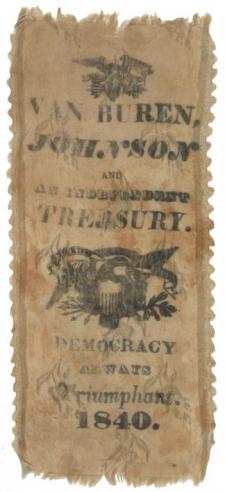 Harrison became the showtime candidate to give speeches on his ain behalf, but he bars himself to talking about his military career. Every bit opposed to its candidate'due south rustic prototype, the Whigs mocked Van Buren every bit an effete dandy who drank from gold goblets in the White House while the people suffered from tough times. Because Van Buren was too well known, the Democrats could non projection the same "mutual human" persona for their candidate and were unable to compete with this new type of entrada strategy.
Harrison became the showtime candidate to give speeches on his ain behalf, but he bars himself to talking about his military career. Every bit opposed to its candidate'due south rustic prototype, the Whigs mocked Van Buren every bit an effete dandy who drank from gold goblets in the White House while the people suffered from tough times. Because Van Buren was too well known, the Democrats could non projection the same "mutual human" persona for their candidate and were unable to compete with this new type of entrada strategy.
More than people voted in this election than in any previous one (80 pct of eligible voters). Harrison received 234 balloter votes to 60 for Van Buren. Later simply a calendar month in part, withal, Harrison caught pneumonia and died. There were no constitutional guidelines for succession after the death of a sitting president, so John Tyler only assumed the full powers of the president, thus establishing the precedent that the vice president would serve as president rather than equally interim temporary master executive until the adjacent election. Virginia cast its 23 electoral votes for Martin Van Buren.
Ballot of 1844
The Whig Party nominated Henry Clay for president in 1844. This was Clay'southward 3rd attempt, each time representing a different Party. Martin Van Buren was the early on favorite for the Democratic nomination, but he failed to get the necessary ii-thirds majority on the showtime ballot of the convention. It took 9 more than scroll calls before the Democrats decided on 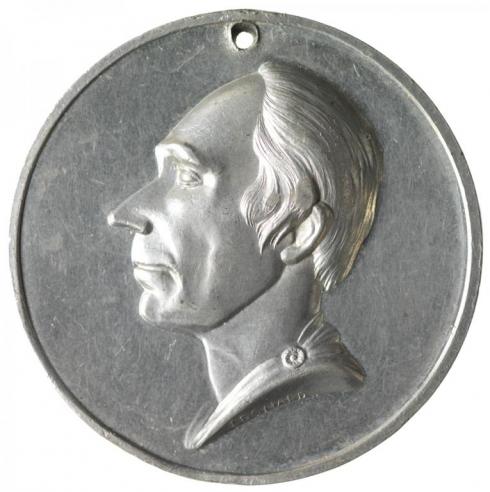 James K. Polk, the state'south beginning "night equus caballus" or unexpected candidate. The antislavery Freedom Party, which had received some popular back up in the 1840 election, once more nominated James Birney. The major issue of the campaign was territorial expansion, which included annexation of Texas and occupation of the Oregon territory (with the slogan "54 40 or Fight" indicating the latitude boundary that the U.s.a. desired in dispute with Bang-up Britain). Texas, which had gained independence from United mexican states and had become a split republic in 1836, wished to join the United States. Although the South was in favor of this, there was opposition in the North to the prospect of adding another slave state to the Union. Sectional tensions began to appear in a national election.
James K. Polk, the state'south beginning "night equus caballus" or unexpected candidate. The antislavery Freedom Party, which had received some popular back up in the 1840 election, once more nominated James Birney. The major issue of the campaign was territorial expansion, which included annexation of Texas and occupation of the Oregon territory (with the slogan "54 40 or Fight" indicating the latitude boundary that the U.s.a. desired in dispute with Bang-up Britain). Texas, which had gained independence from United mexican states and had become a split republic in 1836, wished to join the United States. Although the South was in favor of this, there was opposition in the North to the prospect of adding another slave state to the Union. Sectional tensions began to appear in a national election.
Initially, Henry Clay was opposed to Texas annexation, claiming that information technology might lead to another war with Mexico. To appease both southern and northern voters, he tried to compromise on the effect by modifying his position to allow annexation if "done without dishonor, without state of war." This angered antislavery northern voters. On other issues, Dirt continued to promote the protective tariff, national bank, and his "American organization" of internal improvements. James Polk and his Democratic supporters felt it was the country'south "Manifest Destiny" to expand westward. They believed that the addition of Oregon to the Us every bit a free territory would offset the annexation of Texas as a slave state.
In a close race, Polk defeated Dirt with 170 electoral votes to 105. Polk'south margin of victory, however, was but xl,000 out of the 2.7 million popular votes cast. Clay'due south waffling on the Texas annexation issue and the loss of abolitionist votes to the Liberty Party may have cost him the ballot. Virginia cast its 17 electoral votes for James Polk.
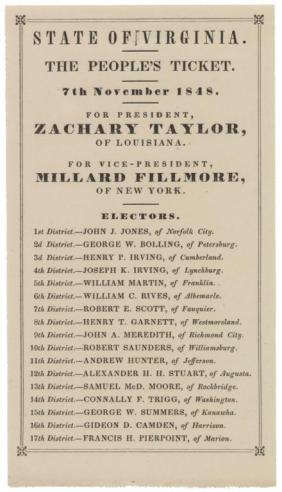
Election of 1848
The annexation of Texas had led to a state of war with Mexico. The result was a treaty that ceded the territories of New Mexico and California to the Us. In a compromise with Britain, the Oregon territory was as well obtained with the northern boundary set at the 49th latitude line.Consequently, the major issue of the 1848 entrada was whether slavery should be extended by police into the newly acquired territories.
As he had promised, President James Polk declined to run for a second term. The Autonomous Party, which was deeply divided on the slavery issue, nominated Lewis Cass on a platform that advocated the principle of popular sovereignty, which immune the people living in the new territories to make up one's mind for themselves whether to allow slavery. A faction of the Democratic Party, known every bit the 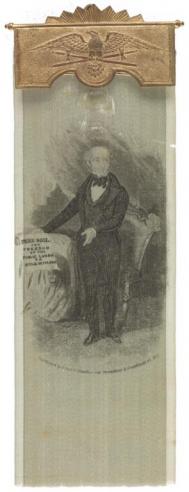 "Barnburners," that was vehemently opposed to slavery and the Cass platform joined with others to form the Gratuitous Soil Party. Nominating Martin Van Buren as its candidate, the Free Soil Party opposed the extension of slavery in federal territories or new states. The Whig Party once again turned to a military war hero as its candidate. Zachary Taylor, nicknamed "Old Rough and Set," was unknown politically. He had won a series of victories in the Mexican War, and every bit a southerner and slaveowner, Taylor attracted the southern vote. To residuum the ticket, northern ex-Congressman Millard Fillmore was nominated for vice president.
"Barnburners," that was vehemently opposed to slavery and the Cass platform joined with others to form the Gratuitous Soil Party. Nominating Martin Van Buren as its candidate, the Free Soil Party opposed the extension of slavery in federal territories or new states. The Whig Party once again turned to a military war hero as its candidate. Zachary Taylor, nicknamed "Old Rough and Set," was unknown politically. He had won a series of victories in the Mexican War, and every bit a southerner and slaveowner, Taylor attracted the southern vote. To residuum the ticket, northern ex-Congressman Millard Fillmore was nominated for vice president.
The ballot effect was a Taylor victory by 163 electoral votes to 127 for Cass. Taylor received 47 per centum of the pop vote to 42.5 percent for Cass and 10 percent for Van Buren. The vote for Taylor and Cass was every bit divided between existing slave and free states. The Free Soil Party took abroad some northern votes that might have gone Autonomous. Virginia cast its 17 electoral votes for Lewis Cass.
Election of 1852
In 1850, Vice President Millard Fillmore assumed the presidency when President Zachary Taylor died, plain from gastroenteritis. During Fillmore's term, Henry Clay offered the Compromise of 1850 in an effort to solve the territorial slavery problem. Amidst its provisions were the admission of California every bit a gratuitous state and the terminate of the slave merchandise in Washington D.C. To appease the Due south, there were stricter fugitive slave laws requiring the return of runaway slaves to their masters. Allowing for pop sovereignty, Utah and New Mexico were organized as territories without mention of slavery. Although both major parties' platforms endorsed the Compromise of 1850, each side had difficulty in selecting a presidential nominee.
The Whig Party, bypassing potential candidates Daniel Webster and President Fillmore, took 53 ballots to select another military hero as their candidate. General Winfield Scott had been a successful commander in the Mexican War. Although Scott promised strict enforcement of the Fugitive Slave Law, the Whigs could not unify their political party on this issue. Amid the potential Democratic nominees were Stephen Douglas, James Buchanan, and Lewis Cass. After 49 ballots, the Democrats once more selected another "night horse" candidate. Although he was a northerner opposed to slavery, Franklin Pierce supported the Compromise of 1850 and the Democrats appeared united behind him as their candidate. The Free Soil Party selected U.Due south. senator John Hale.
Because the parties had similar platforms regarding the slavery consequence, the ballot centered on personalities. Despite Whig Party attacks on Franklin Pierce'southward character, he won easily, receiving 234 electoral votes (fifty.viii pct of the popular vote) to 42 (43.nine percent) for Scott. Unhurt received only 5 percent of the popular vote. The election marked the terminate of the Whigs as a viable party. Virginia cast its 15 balloter votes for Franklin Pierce.
Election of 1856![Silver rebus medalet with the side profile of James Buchanan and the words,]()
Because of the growing sectional crisis over the institution of slavery, there was intense interest in the 1856 ballot. In 1854, Democratic senator Stephen Douglas introduced the Kansas-Nebraska Act to encourage western settlement and the development of a transcontinental railroad. Under Douglas's principle known as popular sovereignty, settlers in the territories could vote to make up one's mind for themselves whether to let slavery in Kansas and Nebraska. The issue was a bitter struggle between proslavery and antislavery factions to control Kansas—known because of its farthermost violence as "Bleeding Kansas." Many northerners were adamantly opposed to the extension of slavery into these new territories. An additional result in 1856 centered effectually a reaction against increasing Irish and German immigration to America. The American Political party, also called the "Know Nothings," had originated as a semisecret, anti-immigrant, anti-Catholic, and anti-Irish political organisation.
Northern Whig and Free Soil Party members and antislavery Democrats united to course a new Republican Political party. They demanded a repeal of the Kansas-Nebraska Act and pledged to oppose any expansion of slavery. The new political party's presidential nominee was John C. Fremont, a former military officer and western explorer. The Democrats decided to featherbed Franklin Pierce and Douglas and nominate the less-controversial James Buchanan for president. He had non been involved in the debate over the 1854 act and, although a northerner, was besides considered to exist sympathetic to southern causes. The American Party nominated Millard Fillmore as its candidate. Although it lost some of its antislavery northern members to the Republicans,the American Party ran on the slogan "America For Americans" and promised to preserve the Spousal relationship.
Fremont had no support in the South and did not announced on the ballot in some states, while Buchanan had the support of the entire South, as well as several northern states. Buchanan received 174 electoral votes to 114 for Fremont. Fillmore received only 8 balloter votes (from Maryland). Virginia bandage its 15 electoral votes for James Buchanan.
Ballot of 1860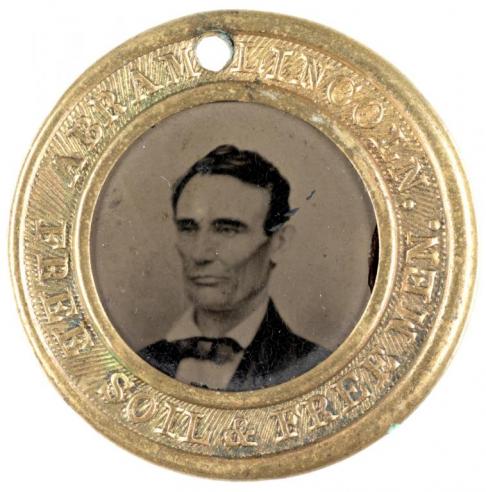
Past 1860, all attempts at compromise over slavery and territorial expansion had failed, and a series of national events brought the sectional disharmonize to a crisis. In the Dred Scott determination of 1857, the Supreme Court ruled that Congress did not have potency to outlaw slavery in the territories, declared the Missouri Compromise unconstitutional, and decreed Kansas a slave state. Ceremonious war betwixt proslavery and antislavery groups continued in Kansas. In 1859, the abolitionist John Brown raided the arsenal at Harpers Ferry, Virginia, in an attempt to starting time a slave insurgence. The controversy over slavery was the dominant event in the 1860 presidential entrada.
The offset Democratic convention took place in Charleston, S.C. Information technology failed to nominate a candidate considering of disagreement betwixt the southern and northern wings of the political party. A 2nd convention in Baltimore nominated Stephen Douglas on the popular sovereignty platform. Delegates from the southern states demanded that the federal government protect the right of slavery in the territories and walked out of the convention. The southerner Democrats nominated the current vice president, John Breckenridge, every bit their candidate. The Republicans met in Chicago that year. Although Abraham Lincoln did not attend the convention, his friends and supporters packed the hall and secured his nomination. The Republican Political party platform opposed the expansion of slavery into the western territories only did not claiming the establishment in states where it already existed. Although pop in the North, the Republicans received near no support in the south. The Constitutional Union Party, consisting of former Whig and American Political party members, nominated sometime U.S. senator John Bell. Its platform did not mention slavery but called for maintenance of the Constitution, the Matrimony, and the law.
In the campaign, Republican Party strategy centered on presenting Lincoln as a rustic "human being of the people." Douglas became the kickoff presidential candidate to actively make a personal bout of the country, speaking on his own behalf. Following tradition, the other candidates did non personally campaign. Though Lincoln received less than 40 percent of the popular vote and none from the south, he had a clear majority of the balloter vote (180 to 72 for Breckenridge, 39 for Bong, and 12 for Douglas). Douglas, yet, did receive about 30 percent of the popular vote.
Between Lincoln'due south election and his inauguration, vii southern states seceded from the Union and formed the Confederate States of America (four more states joined later). Jefferson Davis was elected to a six-year term as its president in November 1861. Virginia cast its 15 electoral votes for John Bell.
Election of 1864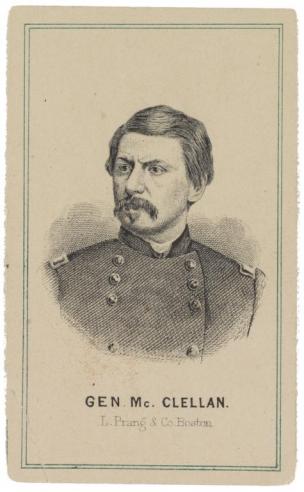
Despite arguments that the presidential election should not be held during a civil war, Abraham Lincoln was determined that information technology should not exist postponed. His chances for reelection, withal, appeared slim. The North was weary of the war with its massive casualties and no end in sight.
To emphasize the preservation of the Union, Republicans joined forces with "State of war" Democrats and changed their proper name to the National Union Party. The party'southward platform called for surrender by the South and a constitutional amendment to end slavery. Lincoln hands won renomination on the starting time ballot. War Democrat and one-time Tennessee senator Andrew Johnson was selected as Lincoln'south running mate. Not all Republicans agreed with Lincoln's nomination. The more than radical wing of the party favored John C. Fremont, but he withdrew from consideration. The Democratic Party also pledged to end the war. "Peace" Democrats nominated Maj. Gen. George B. McClellan, former commander of the Army of the Potomac, and called for a negotiated peace to restore the state equally it was before the war began.
The campaign turned on positive results on the battlefield. Just before the election, United States victories by Generals Sherman and Sheridan at Atlanta and in the Shenandoah Valley, respectively, boosted the northern public's morale and restored their faith in the Lincoln assistants. In the election, Lincoln won in a landslide, with 212 Electoral votes to 21 for McClellan. Virginia, forth with all of the other members of the Amalgamated States of America, did not vote in the 1864 election.
Ballot of 1868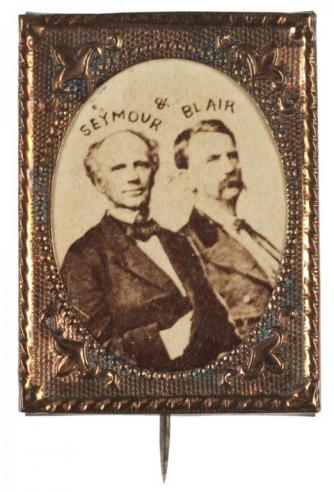
On Apr 14, 1865, five nights afterwards Robert E. Lee'due south surrender of the Amalgamated Ground forces of Northern Virginia at Appomattox, which ended the war in Virginia, Abraham Lincoln was assassinated. Vice President Andrew Johnson was sworn in the following day and equally president immediately faced the problem of bringing the Amalgamated states back into the Matrimony, also as dealing with former enslaved southerners. Constant battling betwixt the president and the radical Republicans in Congress eventually led to impeachment proceedings in February 1868. Johnson was acquitted past one vote. The postwar reconstruction of the south was the dominant issue of the 1868 presidential election. But a few weeks subsequently the impeachment trial of Andrew Johnson, the Republican Party met to nominate Union war 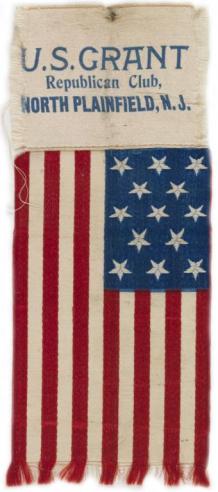 hero Ulysses S. Grant as its candidate. The radical Republicans, who dominated the party, promoted a platform demanding black suffrage in all the southern, reconstructed states, though northern states could individually decide this issue. The Democratic Party took twenty-two ballots to cull a reluctant candidate, Horatio Seymour, who initially refused the nomination. The Democratic platform opposed radical reconstruction and chosen for restoration of all rights to southern states with voting privileges to exist determined by the citizens of each country.
hero Ulysses S. Grant as its candidate. The radical Republicans, who dominated the party, promoted a platform demanding black suffrage in all the southern, reconstructed states, though northern states could individually decide this issue. The Democratic Party took twenty-two ballots to cull a reluctant candidate, Horatio Seymour, who initially refused the nomination. The Democratic platform opposed radical reconstruction and chosen for restoration of all rights to southern states with voting privileges to exist determined by the citizens of each country.
Despite threats, violence, and the formation of such groups equally the Ku Klux Klan, more than 400,000 blacks voted in the ballot. A vast bulk of their votes were cast for the Republican candidate. Grant was hands elected with 214 balloter votes to lxxx for Seymour. The Republican Party's popular vote majority was only 310,000, indicating how crucial the black vote had been to Grant's ballot. Texas, Mississippi, and Virginia had not yet been readmitted to the Spousal relationship and did not vote.
Election of 1872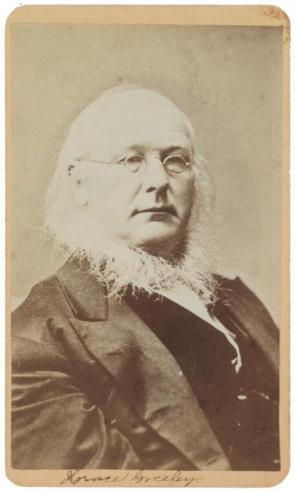
Although he personally was not implicated, President Ulysses S. Grant'due south first term was marked by scandals and corruption. Nonetheless, the Republican Political party nominated Grant for reelection and called for federal protection of black rights. Henry Wilson replaced Vice President Schuyler Colfax equally Grant'southward running mate. Non all Republicans agreed with the choice of Grant. Calling themselves the Liberal Republicans, and demanding a platform concerning civil service reform and an end to federal troop occupation in the Due south, this reform group nominated Horace Greeley, the former editor of the New York Tribune, for president. The Democratic Political party had no feasible candidate. Even though Greeley'due south paper had been by and large anti-Democrat, the Democrats joined forces with the Liberal Republicans in supporting Greeley and vice presidential candidate Benjamin Gratz Brownish. In the 1872 election, Victoria Woodhull, representing the Equal Rights Party, became the first woman to run for president. Her running mate was Frederick Douglass, the former slave and famed abolitionist.
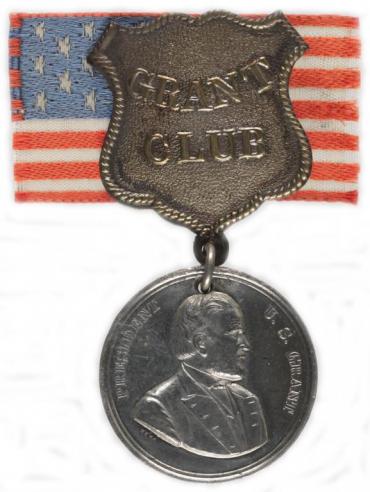 The election was not close. Grant received 286 electoral votes to 66 for Greeley. After the general election, however, Greeley's wife died, and he was committed to a mental institute where he died before the electoral votes were cast. Every bit a result, his electoral votes were separate among several other candidates. Virginia, in its beginning election since beingness readmitted to the Union, cast its eleven electoral votes for Ulysses South. Grant.
The election was not close. Grant received 286 electoral votes to 66 for Greeley. After the general election, however, Greeley's wife died, and he was committed to a mental institute where he died before the electoral votes were cast. Every bit a result, his electoral votes were separate among several other candidates. Virginia, in its beginning election since beingness readmitted to the Union, cast its eleven electoral votes for Ulysses South. Grant.
Source: https://virginiahistory.org/learn/historical-book/chapter/elections-1832-1872
Post a Comment for "Ho Became President in 1868 and Again in 1872 Who Became President in 1868 and Again in 1872"